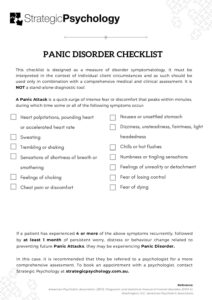
Panic Disorder Checklist
458 KB
This checklist is designed as a measure of disorder symptomatology. It must be interpreted in the context of individual client circumstances and as such should be used only in combination with a comprehensive medical and clinical assessment. It is NOT a stand-alone diagnostic tool.
This checklist is designed as a measure of disorder symptomatology. It must be interpreted in the context of individual client circumstances and as such should be used only in combination with a comprehensive medical and clinical assessment. It is NOT a stand-alone diagnostic tool.
A Panic Attack is a quick surge of intense fear or discomfort that peaks within minutes, during which time some or all of the following symptoms occur:
Heart palpitations, pounding heart or accelerated heart rate
Sweating
Trembling or shaking
Sensations of shortness of breath or smothering
Feelings of choking
Chest pain or discomfort
Nausea or unsettled stomach
Dizziness, unsteadiness, faintness, light headedness
Chills or hot flushes
Numbness or tingling sensations
Feelings of unreality or detachment
Fear of losing control
Fear of dying
If a patient has experienced 4 or more of the above symptoms recurrently, followed by at least 1 month of persistent worry, distress or behaviour change related to preventing future Panic Attacks, they may be experiencing Panic Disorder.
In this case, it is recommended that they be referred to a psychologist for a more comprehensive assessment. To book an appointment with a psychologist, contact Strategic Psychology on (02) 6262 6157 or email support@strategicpsychology.com.au.
Reference: American Psychiatric Association. (2013). Diagnostic and statistical manual of mental disorders (DSM-5). Washington, D.C.: American Psychiatric Association.
